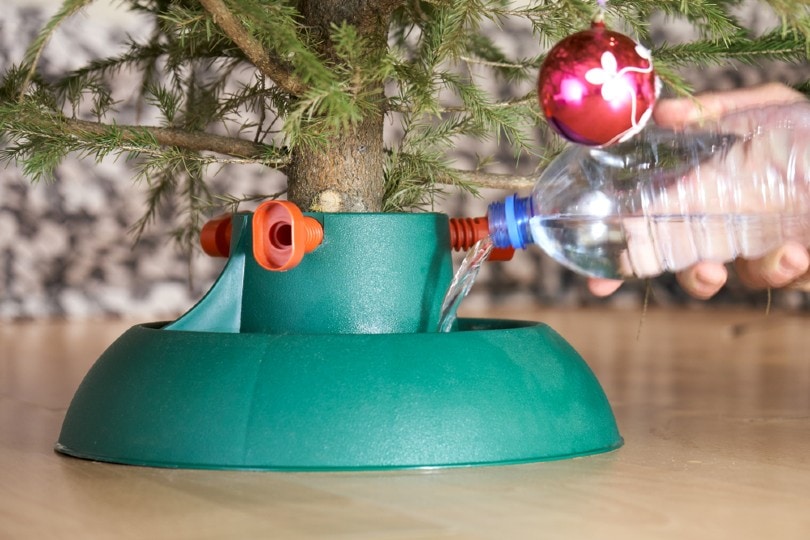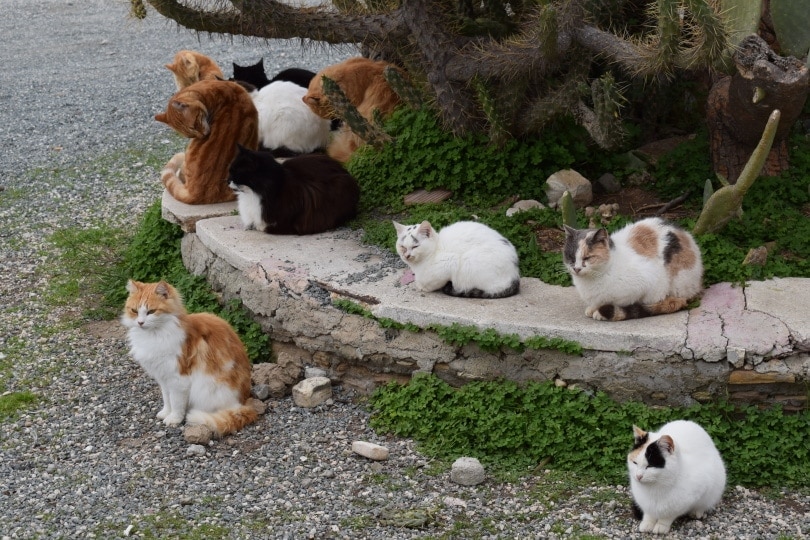Can Cats Eat Cashews? Vet Answer

Updated on
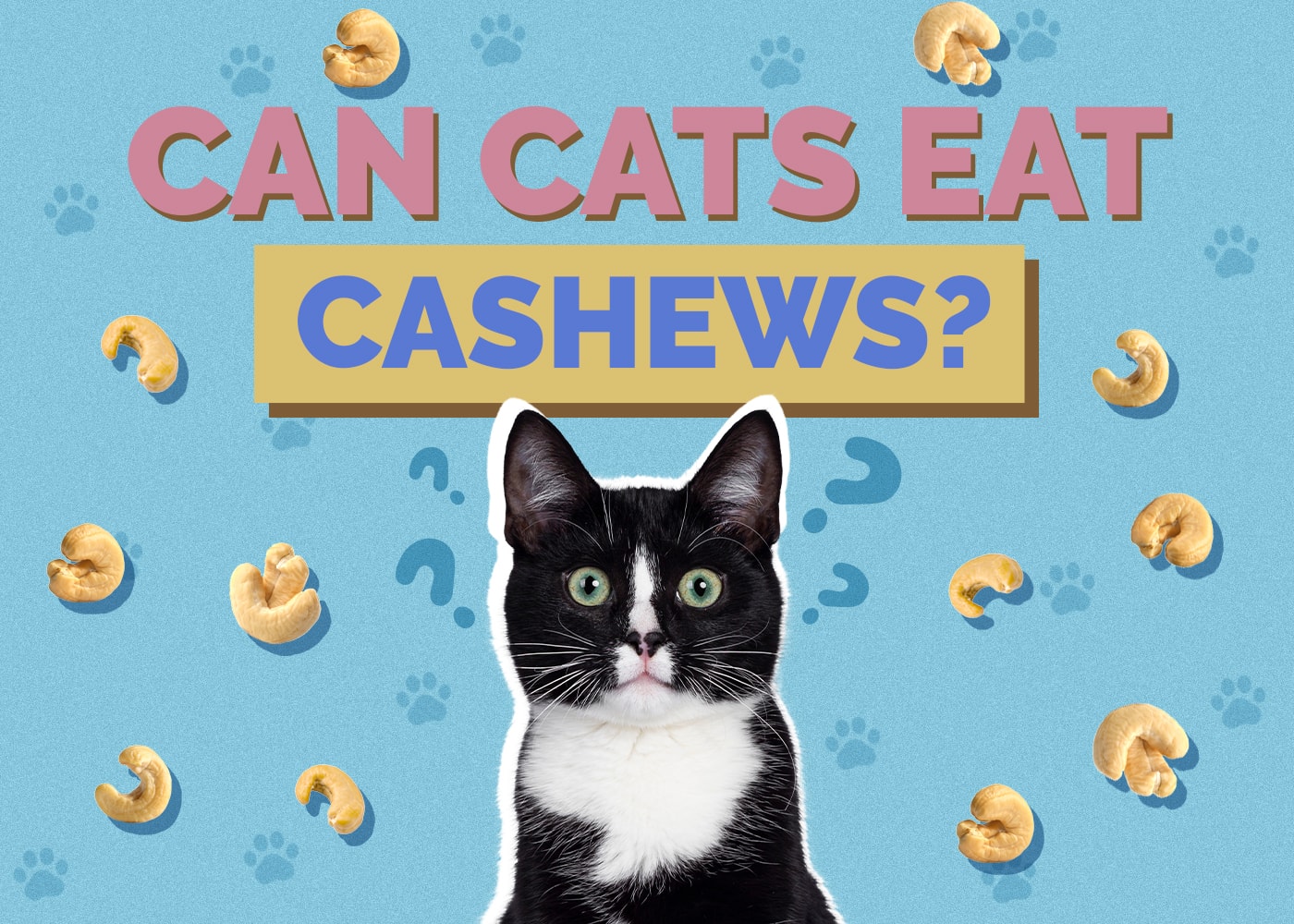
Nuts are filled with protein, fat, fiber, vitamins, and minerals. They are considered a healthy addition to the human diet and we are encouraged to eat more of them throughout the week. However, cats are obligate carnivores, which means that their diet, in the wild, would consist solely of meat. They would get all of their protein and other nutrients from meat sources and certainly wouldn’t eat cashews. A quick glance at the ingredients list on a packet of cat food is a clear indication that domesticated cats do get at least some of their nutritional requirements from other sources.
Cashews are not directly toxic to cats as far as the current evidence shows, but because they are high in fat and calories, may be contaminated with mold and cause choking or gastrointestinal blockage, they should not be given to cats. What’s more, large quantities of any nut can cause diarrhea and vomiting.
Before changing your cat’s diet or introducing new ingredients or supplements that they haven’t eaten before, especially when it comes to human food, make sure to consult your veterinarian first. Every cat is different and requires an individual approach to nutrition, depending on their age, health, level of activity, and medical history.
Can Cats Eat Nuts?
Nuts are highly nutritious and are also a good source of omega-3 fatty acids. Omega-3 is especially beneficial to joint health because it has anti-inflammatory properties. And, because it is a fat, it also helps promote good skin and coat health in felines. Different nuts do have different ingredients and different nutritional levels, but nuts should not be a regular part of a cat’s diet. The nutrient benefits for cats are actually quite limited, and in all reality, barely present, while the risk of cats getting ill is genuine.
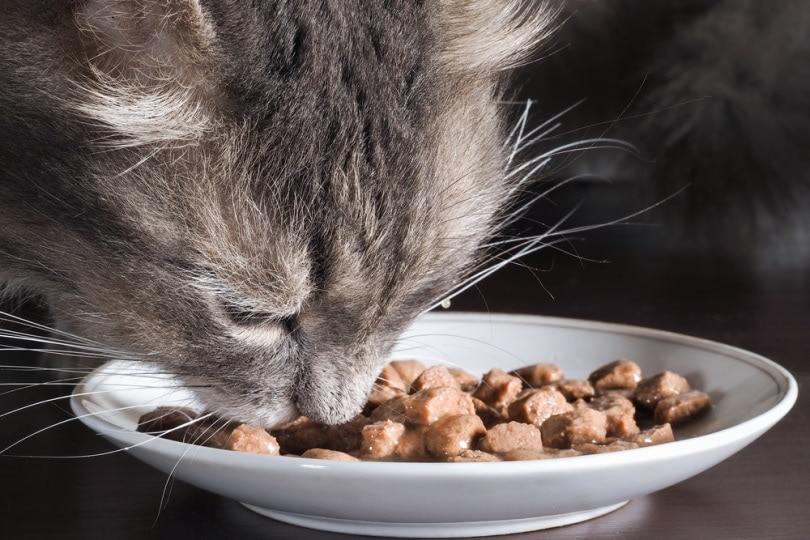
What Nuts Are Poisonous to Cats?
Macadamia nuts are considered toxic to dogs, but it remains unknown if the same applies to cats. The exact form of toxicity is unclear, and there are no known reports of toxicity concerning cats, but veterinary professionals do advise you to avoid giving macadamia to your cat. Although not nuts, grapes, raisins, and avocados are also toxic, and there are various mechanisms responsible for these toxic effects.
 Can Cats Eat Cashews?
Can Cats Eat Cashews?
While your cat should not be given macadamia, cashews are not considered toxic by the ASPCA, and some sites claim raw cashews could actually be toxic to cats. At this time, we cannot be sure, due to lack of available research. If your feline friend steals one piece off your plate, you should speak to your vet and keep a close eye on them for the next 24-48 hours, but ill effects are unlikely in most cats.
Why You Should Avoid Cashews
While the nuts are not toxic, however, they are high in fat. If your cat is not used to high-fat foods, ingredients like cashews can cause diarrhea and vomiting. Therefore, it’s best to avoid them altogether or give them very sparingly as an occasional treat.
Cashews are naturally high in sodium, even if they are plain and unsalted. Too much sodium in a feline diet can cause dehydration and increased thirst, although the amount of sodium per cashew is unlikely to cause a more serious issue in cats. Dehydration is already a concern for cats because many will drink enough water. Instead of cashews, there are many safe and appropriate cat treats, based on animal meat sources, that cats love and thrive on.
Although cashews are a soft nut compared to the likes of almonds and peanuts, they are still a potential choking hazard to cats. If your cat doesn’t grind the nut down thoroughly before swallowing, it can become lodged in the throat and cause choking or airway obstruction. If it gets swallowed, it may lead to a gastrointestinal blockage. All of these require veterinary attention.
Another common issue with nuts is mold and aflatoxins, although luckily they seem less common in cashews. Still, any discoloration or suspicion of mold is a reason to bin them.
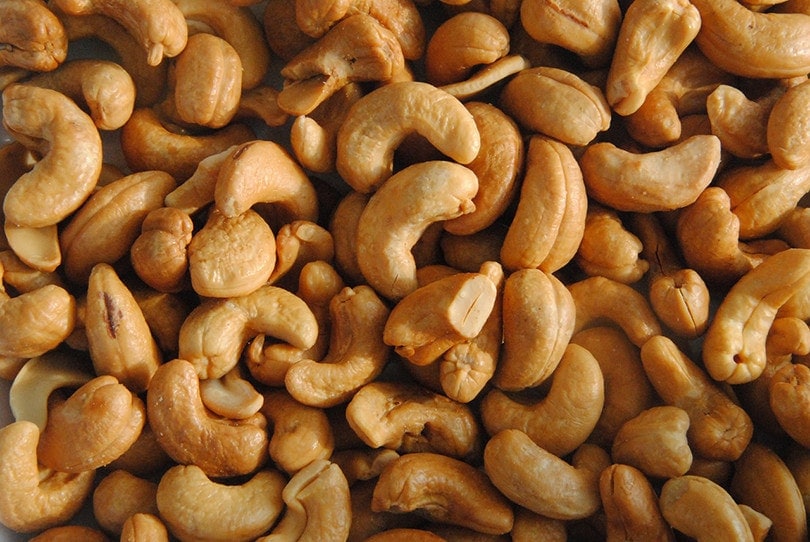
Healthy Alternatives to Cashews
Cashews are not toxic, but they are fattening, can cause diarrhea, and they are a choking hazard, alongside presenting a risk for gastrointestinal blockage. If you want to share some human food treats with your cat, there are healthier and more appropriate alternatives, such as the following five food options:
1. Oily Mackerel
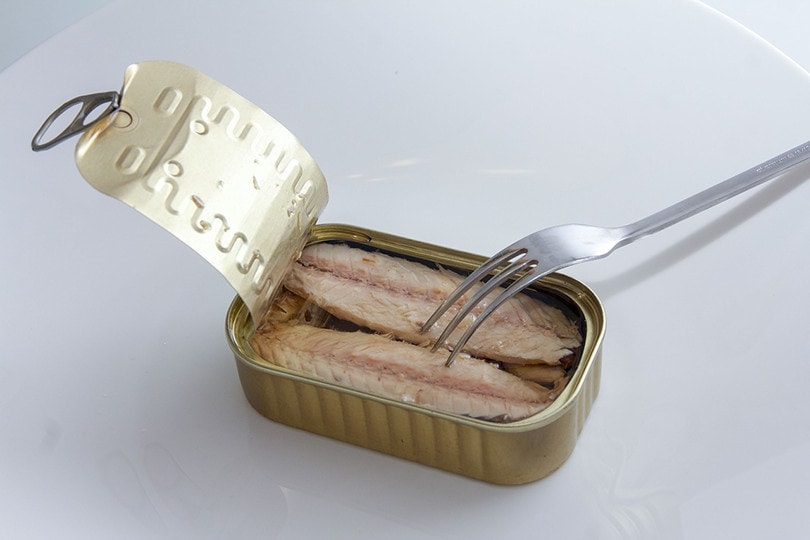
A fish-only diet, especially raw fish, is unhealthy for a cat because it can destroy the thiamine in your cat’s body. A thiamine deficiency can lead to a host of major problems such as neurological conditions and convulsions. Canned mackerel does not contain enough of the essential taurine either. However, as an occasional treat, oily fish like mackerel is good for them. These are packed with omega fatty acids, helping maintain good eyesight, healthy joints, and a responsive brain.
2. Cooked Chicken
Your cat is a carnivore. In the wild, they would eat only meat and animal products and get all the nutrients needed from meat and organs. They might occasionally eat grass or some green leaves presumably to aid with digestion, although we don’t know for sure, but that’s it. Chicken is a good appropriation of what your cat would eat in the wild. While it wouldn’t be cooked, cooked meat poses less risk of bacterial contamination, especially in the case of chicken.
3. Cooked Lean Beef
Cooked lean beef meat can be a nice treat for your cat. A cat’s diet is based on animal protein, including beef, and if they are fed a commercial diet, they may enjoy an occasional meat meal. Cooked meat poses less risk for bacterial contamination but should be free of any spices, salt, and additives. When you prepare it, make sure it’s plain and thoroughly boiled. Raw meat may be an option for some cats and their owners, but make sure you have done your research first, as there are health risks associated with raw meat, for both you and your cat.
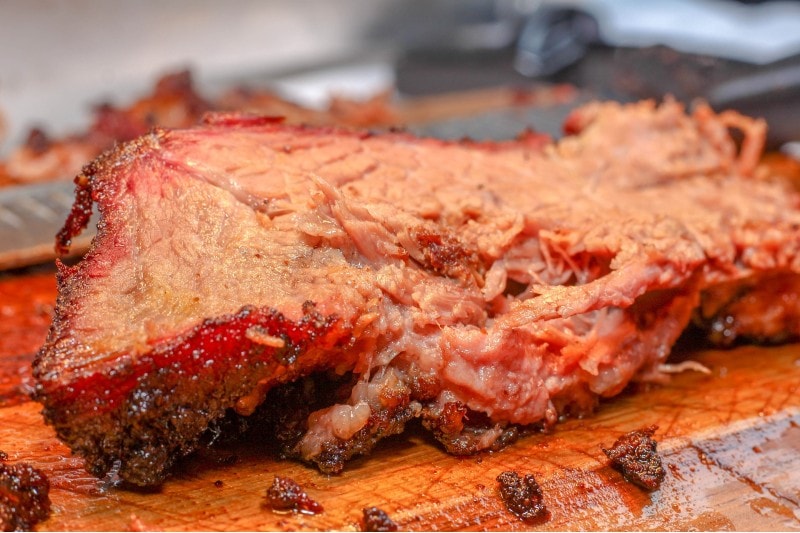
4. No-Bake Treats
There are many treat options that are safe and healthy for your cat, when given in moderation, and you can make some of them yourself. Some can even be made without baking for those not so experienced in the kitchen. They may contain tuna, turkey, a little bit of cheese, oats, pumpkin, and other ingredients, giving your cat a nutritious occasional snack. Check out some of our recipes!
5. Homemade Treats
If, on the other hand, you are great in the kitchen and love to prepare your own food, why not try out some of these homemade recipes? Again, they are based on meat, like turkey, fish like tuna and salmon, veg like carrots and pumpkins, and some rice and eggs. They are also cooked and generally do not take too long to make.
Can Cats Eat Peanut Butter?
Peanut butter is most often made from a combination of peanuts, sugar, salt, and other ingredients. While the peanuts themselves are not toxic to cats, the high levels of sugar and salt, alongside many other additives found in peanut butter, is not good for them so this food should be avoided, although it won’t be toxic if your cat does steal a small amount from your plate. Peanut butter is very sticky and may pose a choking hazard for your cat.
Can Cats Have Bananas?
Although they are sweet and should only be fed in small amounts very occasionally, and without the peel, bananas are a safe treat for cats. They are soft enough that they do not pose a choking hazard and some cats love the taste.
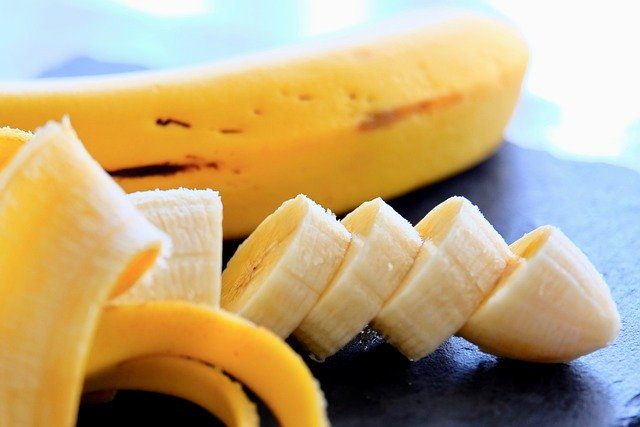
Can Cats Have Cheese?
A lot of cats are lactose intolerant, which means that they should not be given any source of dairy product, including milk and cheese. If your cat eats a small amount, they will probably be OK. If they eat a large amount, monitor your feline friend and look for signs of intolerance, such as vomiting or diarrhea, and consult a vet if you witness any of these signs.
Final Thoughts
Cashews are not toxic for cats according to the ASPCA. However, they are high in fat, which can cause gastrointestinal upset such as vomiting and diarrhea. They also tend to be high in sodium, and too much sodium can cause dehydration, although this is not likely to happen with a small amount of cashews. As such, while little pieces of cashews will not directly harm your cat, they should be avoided altogether. Large pieces can lead to choking and digestive blockage, and the risk of mold is also present but seems quite low. Some alternatives to cashews include meat protein and oily fish like mackerel. Cooked chicken is another good alternative that more accurately replicates a cat’s diet in the wild.
See also:
- Can Cats Eat Pistachios? Vet Reviewed Health & Safety Guide
- Can Cats Eat Peanuts? Vet-Reviewed Health & Safety Guide
Featured Image Credit: tookapic, Pixabay


 Can Cats Eat Cashews?
Can Cats Eat Cashews?
